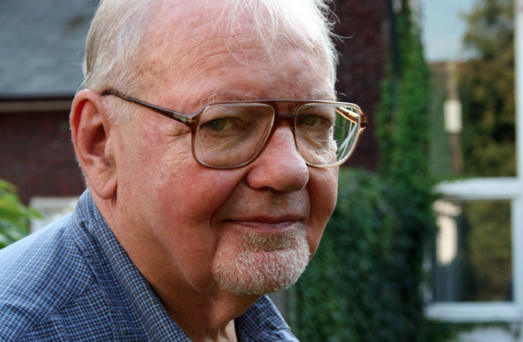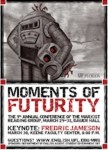Fredric Jameson
Since my undergraduate 10,000 word dissertation on Fredric Jameson's The Political Unconscious: Narrative as a Socially-Symbolic Act (Cornell University Press, 1981), I've been fascinated by Jameson's immense ouevre. His publication of Archaeologies of the Future: The Desire Called Utopia and Other Science Fictions by Verso in 2005 inspired my doctoral research proposal with the University of Nottingham on utopian theory and literature.
In 2007 I was fortunate enough to receive funding to attend the annual conference of the Marxist Reading Group at the University of Florida in Gainesville, where Jameson delivered a keynote. The conference was titled "Moments of Futurity: From Present Conditions to Material(izing) Horizons" [see conference programme here]. My paper (which, to my shock, Jameson attended), "Agency, Technology, Time: The Minor Utopias of John Urry and Michael Hardt and Antonio Negri," explored the ways in which agency encounters the moment of the transnational by interrogating the utopian possibilities emodied in human interactions with new technologies of communication in John Urry’s Sociology Beyond Societies: Mobilities for the Twenty-First Century (2000) and Michael Hardt and Antonio Negri’s Empire (2000) and Multitude (2005). Drawing on Jay Winter’s identification of "minor utopias," distinct from the catastrophic dreamworlds of mass utopianism, the paper identified "moments of possibility" in these two theories of revolutionary agency that broaden our understanding of the intersections between globalised space and time. I argued for a dialectical reading of these critical texts in order to recognise the co-existence of positive and negative possibilities of uneven networks of hybrid temporalities and spatial diversities.
An open dialectic, the paper proposed, is the most suitable model to understand how we can move between the virtual and the real, and the relations of power that are constantly seeking to contain utopian moments of agency. Machines are central to both analyses’ theorisations of the "global flows" that structure our experience and are a vehicle for understanding transnational agency through the lens of production, migration and sovereignty. In particular, a Marxist understanding of agency and the hybrid spatio-temporal virtualities of machinic interaction, I argued, can help us reclaim futurity as a constituent possibility today. Finally, the dialectic offers us a conceptual model for identifying a future that is both unpredictable and yet offers profoundly utopian and immanent socio-political opportunities.
Sadly, this paper was presented in the days before Prezi so I can't share any slides (it was also fairly unusual to use PowerPoint at conferences in the humanities back then too). The conference did, however, have a fantastic poster, of which I can only currently fund a thumbnail (will upload a larger version when I get back to my Lincoln office where it is on the wall in pride of place).








 Dr Caroline Edwards is Senior Lecturer in Modern & Contemporary Literature at Birkbeck, University of London. Her research and teaching specialisms are in 21st century literature and critical theory, science fiction and post-apocalyptic narratives, Marxist aesthetics, and utopianism.
Dr Caroline Edwards is Senior Lecturer in Modern & Contemporary Literature at Birkbeck, University of London. Her research and teaching specialisms are in 21st century literature and critical theory, science fiction and post-apocalyptic narratives, Marxist aesthetics, and utopianism.
You blew Jameson out of the water at MSA. I’m a relatively young acadmeic (although I did manage to get a first book out there) and I run a writing program that is moving, in part with my urging and in part independently, toward a lot of the things that you talked about. But I was fascinated by the ideas you were laying down regarding conferences, regarding new models of review and publication of scholarship, and even regarding where communities of scholars and teachers get together. You have single-handedly revived my waning interest in blogging, as well. Thanks for a wonderful and inspiring talk.
Thanks Telma – very kind words, but I'm not sure they're wholly deserved! I do, however, completely agree about finding new ways of engaging in scholarship but fear that I can't keep up with the demands of regular blogging (for a great example of a young academic who manages this seamlessly alongside academic publishing, see Martin Maul Eve's website: https://www.martineve.com.
Martin and I also edit a new online journal of 21st-century literary criticism called Alluvium: http://www.alluvium-journal.org. This is such an enjoyable project and we hope it can demonstrate that there are interactive spaces for rigorous scholarly debate that don't need to be peer reviewed (hence can be published quicker) and are totally open access.
Anyways, best of luck with your own blogging, and let me know how it goes 🙂